![]() 𝐏𝐚𝐧𝐠𝐚𝐬𝐢𝐧𝐚𝐧 𝐒𝐭𝐚𝐭𝐞 𝐔𝐧𝐢𝐯𝐞𝐫𝐬𝐢𝐭𝐲-𝐀𝐬𝐢𝐧𝐠𝐚𝐧 𝐂𝐚𝐦𝐩𝐮𝐬
𝐏𝐚𝐧𝐠𝐚𝐬𝐢𝐧𝐚𝐧 𝐒𝐭𝐚𝐭𝐞 𝐔𝐧𝐢𝐯𝐞𝐫𝐬𝐢𝐭𝐲-𝐀𝐬𝐢𝐧𝐠𝐚𝐧 𝐂𝐚𝐦𝐩𝐮𝐬
𝐀𝐫𝐥𝐞𝐧𝐞 𝐂. 𝐏𝐚𝐝𝐢𝐥𝐥𝐚
Teenage pregnancy continues to cast a shadow over the lives of many in the Philippines. It disrupts youthful aspirations, derails potential, and imposes immense challenges on families and communities alike. In our deeply conservative society, where familial bonds and cultural traditions are cherished, this issue often remains veiled in silence, dismissed as taboo. Yet, silence cannot resolve a crisis of this magnitude. Among the solutions proposed is Comprehensive Sexual Education (CSE) for Filipino youth. But is this approach a remedy for teenage pregnancy, or does our unique culture necessitate an alternative path?
In 2022, the Philippine Statistics Authority reported 3,135 adolescent pregnancies among girls aged 15 or younger—a staggering 35% rise from the previous year. This escalation is especially troubling given the decline in teenage pregnancies among 15- to 19-year-olds from 8.6% in 2017 to 5.4% in 2022. These statistics underscore an urgent call to action to support Filipino youth.
The Philippines is a nation where conversations about sex and reproductive health are often steeped in reluctance. Many parents avoid discussing these matters with their children, fearing that such openness might encourage precocious experimentation. Meanwhile, educational institutions, influenced by religious and cultural norms, limit their curriculum to rudimentary biology or abstinence-focused instruction. This vacuum of guidance leaves countless Filipino teenagers unprepared to face the complexities of adolescence and their accompanying challenges.
Advocates of CSE posit that it equips youth with the tools to make informed choices about their bodies, relationships, and futures. By imparting knowledge on reproductive health, consent, and the repercussions of early sexual activity, they believe teenagers are empowered to safeguard themselves. Critics, however, caution that CSE could clash with the deeply held moral and cultural values integral to Filipino identity. They fear such programs might inadvertently encourage the very behaviors they seek to prevent.
In a society where faith and family values form the backbone of individual and communal life, solutions cannot be borrowed wholesale from other contexts. What Filipino teenagers need is not merely information but mentorship rooted in our cultural and spiritual ethos. Open communication within families, mentorship programs, and value-centered education could offer a more tailored solution, guiding young individuals to embrace self-respect and accountability.
Empowering parents to discuss sensitive issues openly with their children, grounded in shared values and beliefs, is a vital starting point. Educational institutions can complement this effort by incorporating lessons that cultivate discipline, mutual respect, and reverence for life. Faith-based organizations and local leaders, too, can serve as pillars of support, mentoring the youth and reinforcing a network of guidance that reflects communal values.
The successes of CSE in other nations may seem promising, but the Philippines stands apart. Our collective emphasis on moral principles and familial bonds cannot be overlooked in crafting a solution. Programs that nurture emotional resilience, life skills, and moral character align more closely with the needs of Filipino youth.
To address the issue of teenage pregnancy in the Philippines, we must adopt a culturally resonant, holistic approach. While Comprehensive Sexual Education may hold merit, it is not a panacea for our country’s challenges. Instead, the path forward lies in fostering family dialogue, fortifying moral and spiritual education, and building communities that nurture, guide, and uplift.
Teenagers need more than knowledge—they need connection, compassion, and a sense of belonging. By uniting as families, schools, and communities, we can create a future where every Filipino youth is empowered to make decisions that honor their potential, uphold their values, and build a better society for generations to come.
#VoicesOfSanNicolanianYouth#OpinionMatters#SocialAwareness#TeenagePregnancy#MayorAliciaPrimiciasEnriquez#MayorAliciaPrimiciasEnriquezYourPublicServant#SanNicolasPangasinanMyHomeMyPride

